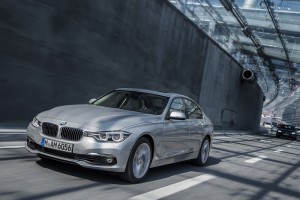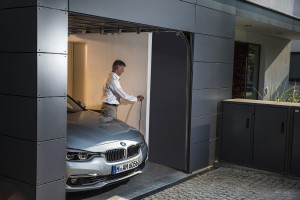It appears that more than just Tesla’s Elon Musk thinks that the auto industry’s future is electric. The recent Frankfurt Motor Show was inundated with EVs, with the most intriguing perhaps being BMW’s 330e.
For 2016, BMW redesigned the 3-Series and has been steadily showing off the variants of it for several months, but the maker waited for the biggest stage, Frankfurt, to charge into the most technologically advanced 3-Series ever made.
The 330e uses the company’s well-regarded modular eDrive plug-in technology from its i3 electric city can and the i8 supercar. It produces 252 horsepower and 310 pound-feet of torque from the combination of the electric motor and its 2.0-liter four cylinder engine.
The new EV can hit 75 mph using battery power alone and has a range of 25 miles, according to BMW, using its 7.6-kWh lithium ion battery pack. It’ll get from zero-to-60 mph in just 6.1 seconds. Not Model S fast, but not everyone feels the need to be ludicrous about getting to 60 mph.

The new 330e can reach 75 mph in electric-only mode. It also has a range of 25 miles on battery powwer only.
BMW estimates the 330e will get between 112 and 124 mpg, based on European standards. There are no EPA equivalents, which leads to the downside of the 330e: BMW officials have been mum on whether or not they’re even bringing the EV to the U.S.
The Bavarian maker’s 330e is just one of 11 possible configurations available, although not all in the U.S. for the 3-Series. The choice of engines for the new BMW 3 Series comprises four gas and seven diesel units at market launch. Depending on the particular engine variant, power is transferred via traditional rear-wheel drive or, alternatively, via the BMW xDrive intelligent all-wheel-drive system.
(BMW unveils new X1 luxury compact crossover. For more, Click Here.)
The company is perhaps the master at giving buyers, or more precisely particular buyers, the vehicle they want. The result? More than 14 million 3-Series sold globally. One of the more intriguing models also borrows from BMW’s i-Series.
The new 318i, which helps pushed the company’s then-entry-level model, to great success in the U.S., features the same 1.5-liter turbocharged 3-cylinder engine used by its i8 supercar. The powerplant puts out 134 hp and 162 ft-lb of torque.
(Click Here for details about Honda’s plans for the new Civic.)
Even though Americans are taking to smaller turbocharged engines putting out big power numbers, BMW apparently believes that the 3 cylinder will not gain enough traction in the U.S. The impressive mileage numbers, about 50 mpg, aren’t substantive enough in the land where gas prices are hovering around the $2 per gallon mark aren’t expected to rise significantly any time soon.
Instead, the U.S. gets the new 340i, it replaces the outgoing 335i, with a new 3.0-liter twin turbo inline six putting out 320 hp and 338 ft-lb of torque. BMW claims zero-to-60 times are 4.8 seconds with rear-wheel drive and 4.6 seconds with xDrive.
(To see more about the tentative contract between FCA and the UAW, Click Here.)
All of the 3-Series engines can be had with rear- or all-wheel drive. The gas engines offer the choice of a revised eight-speed automatic or a six-speed manual, which now includes a rev-matching function. Only the 340i, however, combines xDrive with the manual.


As noted by myself and other people, any auto maker selling cars in the U.S. has no choice but to sell hybrids, EVs and even bicycles to lower the fines they will pay for not being able to meet the absurd 54.5 mpg CAFE decree by Obama and the EPA who are blackmailing car makers and consumers.
It’s not so much CAFE as the ZEV mandate in California, for one thing.
CA is run by lunatics. Yes they have a serious air quality problem, regular droughts, mudslides, earthquakes, etc. If CA were to deport all of the Mexican illegals they could resolve most of their challenges including air pollution.
Expecting everyone in the U.S. to fix the problems CA has created is unrealistic. CA is financially broke because their jails are 70% filled with illegals and social services can’t deal with or even keep track of the growth of illegals into CA. And to make matters worse the IRS is sending refund checks to Mexican nationals working in the U.S. who claim tax deductions for their families living in Mexico.
Not to get toooo political, Jorge, but who will be picking lettuce in the Central Valley and artichokes and garlic in Gilroy?
Those would be people who want jobs and producers willing to pay a proper, fair price for labor. That’s who. Does anyone actually think it’s appropriate to exploit migrant workers?